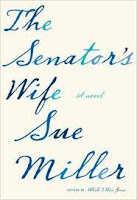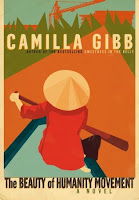 Mo Hayder remains one of my favourite crime writers. I had the good fortune to interview her a couple of years ago when she was in Toronto promoting the Walking Man series, still Jack Caffrey mysteries, but with the introduction of Flea Marley, the police diver, who becomes the other central character in the books. She’s self-educated, incredibly smart, and it was one of the best interviews I had ever done (and she was very gracious when she signed my book).
Mo Hayder remains one of my favourite crime writers. I had the good fortune to interview her a couple of years ago when she was in Toronto promoting the Walking Man series, still Jack Caffrey mysteries, but with the introduction of Flea Marley, the police diver, who becomes the other central character in the books. She’s self-educated, incredibly smart, and it was one of the best interviews I had ever done (and she was very gracious when she signed my book).
Annnywaaay, I’ve had Birdman, the first Jack Caffrey mystery, on my shelf for about four years. Every time I look through my books to see what I should pick up next, I think, I should really read that Mo Hayder novel. I guess, with everything, and with my own superstitious nature about reading (books are ready for you at the right time in your life and never before… that’s why you can’t finish them if you start and put them down again
I don’t know what it is about motherhood that inspires me to want to watch and read about murder and mayhem. I’ve been only keeping up with shows like Law and Order UK, Detroit 1-8-7, and watching the boxed set of Prime Suspect. My friend Duncan suggested it’s because crime novels are easy to pick up and put down. You feel like you’ve accomplished a little something when you get to the end of a police drama: there’s a mystery, it gets solved, people are punished. It’s all my overloaded, exhausted brain can handle. Well, he’s got a point. And maybe the escapism I used to get from watching movies, I’m finding in a good, solid, mystery/thriller here and there.
So, Birdman. It’s a fairly typical crime novel, of course, because it’s Mo Hayder, it’s extremely well written and utterly readable. It charges along at a fast clip and before you know it, Jack’s done it again: ruined another relationship, pissed off a whole bunch of people, and solved a heinous crime (in this case a lot of dead prostitutes/strippers/addicts) involving a serial killer (or killers). In a way, this novel is more structured than Hayder’s later books. I’m not sure if this is part of a series with anything more linking it than Caffrey as the main character because it’s all tied up very neatly at the end — that’s not to say it’s a happy conclusion — but there’s a finality to this book that the Walking Man novels don’t have. They all seem to pick up where the other left off in a deliciously addictive way.
Jack’s new to the force in London, and it’s his first big case. When they uncover the bodies of five women, all mutilated, all murdered, there’s conflict in the force. There are clues that lead a racist, repugnant DI Diamond in the wrong direction and Jack, along with his partner Essex, have to fight against the curve to get everyone working in the right direction. His profile is correct, and when we meet the villain about eight pages in, you get the feeling that it’s all coming together a bit too quickly, you know, like when the cops disappear too soon on Law and Order, and you know there’s trouble with the case…and low and behold, once the villain becomes known to the police, the killing doesn’t stop. So who is the real Birdman? Of course, it’s a race against time for Caffrey and Essex to figure it out because there are real people involved now — not just victims, but people with personal relationships to these officers.
Part of Vintage Canada’s World of Crime series, I love how the jacket copy says, “For some killers, murder is just the beginning…” It’s a pretty terrific tagline and utterly relevant to this particular book. I love it when there’s a twist that’s hinted, ever so slightly upon toward the beginning of the novel, and explodes at just the right time in the reading. Hayder’s exceptional at creating completely creepy villains who do absolutely disgusting things. Yet, the level of (for lack of a better word) “grossness” that Hayder employs in her writing is consistently balanced with razor-sharp prose, snappy dialogue and intense research. These novels are solid, have ripping plots (how else do you read them in a night while breastfeeding a baby?) and hinge upon a fascinating character that she’s created in Caffrey. I mean, he does remind me a little of Jackson Brodie — Kate Atkinson’s protagonist — they’re both damaged in a way that makes them so good at their job. In Caffrey’s case, it’s the disappearance of his younger brother when he was eight and the passionate way he’s convinced his next-door neighbour, whom he still lives beside, is responsible for his murder.
Unlucky in love seems to be the MO for these kind of men, which, of course, makes them irresistible on the page, both to the reader and to just about every woman in their path. But romance never works out for Jack and it’s a good thing too because how else would he solve the crime and save the day? I’d highly recommend any Mo Hayder novel for the crime/thriller lover. She’s such an exceptional writer that it’ll totally satisfy your craving for good sentences as much as your craving for, as my grandmother used to say, “a good whack on the head.”
READING CHALLENGES: The Off The Shelf Challenge, of course. I already have a British writer for my Around the World in 52 Weeks, so I can’t double count Hayder.
WHAT’S UP NEXT: I started Sebastian Barry’s A Long, Long Way this morning and it absolutely reminded me of one of my all-time favourite books, A Star Called Henry, and so I’m hoping to continue it this evening. Not too much time to read today as I was alone with the baby and we took an amazing nap this afternoon. How delicious is it to lie in bed with your baby tucked into your chest, and then wake up with him snuggled right into your arm all smiley and sleepy when you both wake up. Even if the moment only lasts for about five minutes before he wakes up fully and discovers he’s got shitty pants and is starving and, therefore, starts screaming, but it was a bit of bliss on a cold blustery day.








